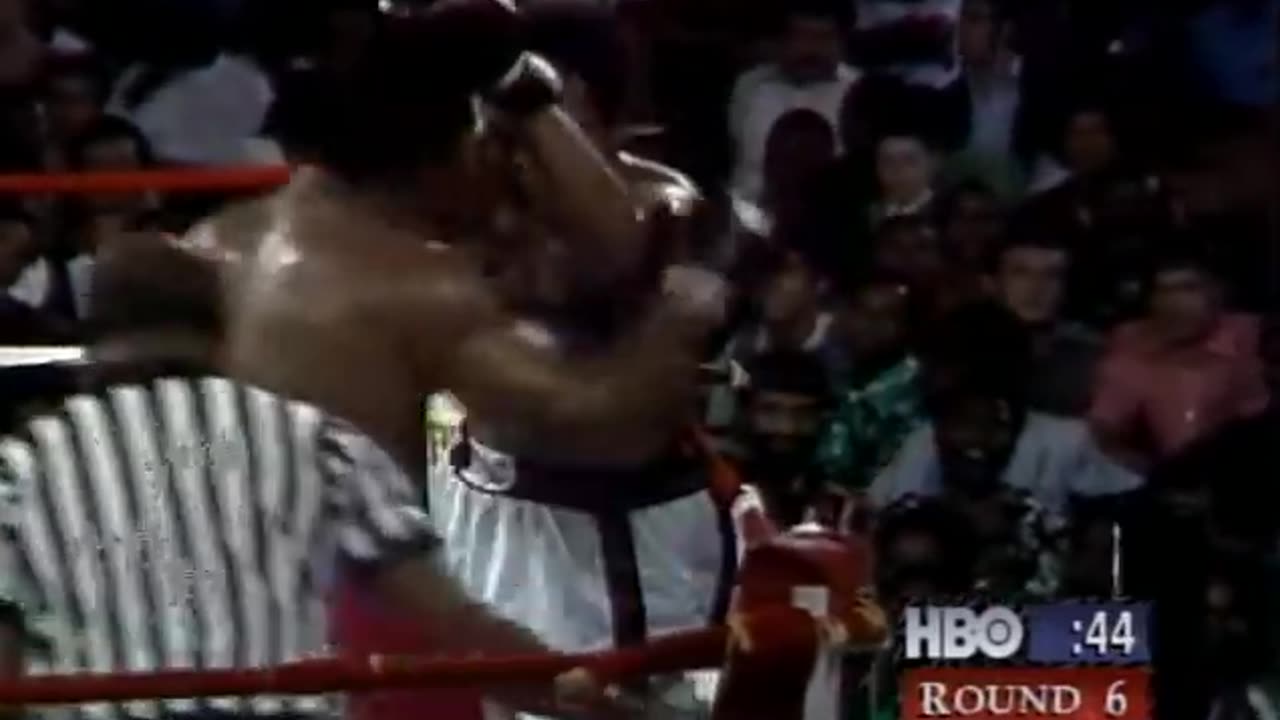Premium Only Content

George Foreman vs Muhammad Ali 30 Oct 1974 - Greatest Boxing Bout Ever
George Foreman vs Muhammad Ali - George Foreman defends the Heavyweight Championship of the World for the third time against former Champion, Muhammad Ali. Ali at 32, had been given little change against the fearsome puncher who had knocked out both Frazier and Norton, whom both had beaten ali in the past, in 2 rounds. The fight took place in Kinshasa, Zaïre (todays Congo), and was put together by promotor Don King. This is considered by many as the most significent fight of Muhammad Alis career. The fight was called Fight of the Year for 1974.
-
Their records at the time
George Foreman: 40-0
Muhammad Ali: 44-2
Muhammad Ali, born Cassius Marcellus Clay Jr., was a legendary boxer who transcended his sport and became a global icon for his athletic prowess, his social activism, and his charisma. He was born on January 17, 1942, in Louisville, Kentucky, and began boxing at the age of 12. He quickly showed a natural talent for the sport and went on to become one of the greatest boxers of all time.
Ali's professional career spanned from 1960 to 1981, during which he won numerous titles and accolades. He became the Olympic gold medalist in 1960, won the heavyweight championship three times, and compiled a record of 56 wins and only 5 losses. He was known for his unique fighting style, which combined quick footwork, lightning-fast punches, and an unorthodox defensive technique that he called the "Ali Shuffle."
However, Ali's impact on the world went beyond his boxing achievements. He was a larger-than-life figure who spoke out on a wide range of social and political issues, including civil rights, war, and religion. He famously refused to be drafted into the Vietnam War, citing his religious beliefs and opposition to the war as reasons for his decision. He was stripped of his boxing titles and banned from the sport for several years, but he continued to speak out against the war and became a symbol of resistance and defiance for many.
Ali's commitment to social justice and civil rights was also evident in his personal life. He converted to Islam in the 1960s and changed his name from Cassius Clay to Muhammad Ali, which he described as his "slave name." He was an advocate for racial equality and spoke out against discrimination and prejudice in all its forms. He also used his platform to support charitable causes and raise awareness about issues such as poverty, hunger, and disease.
Despite his many accomplishments and contributions to society, Ali was not without his flaws and controversies. He was known for his trash-talking and often provocative behavior, which earned him both admirers and critics. He was involved in several high-profile fights, including the "Fight of the Century" against Joe Frazier and the "Rumble in the Jungle" against George Foreman, both of which are considered some of the greatest boxing matches in history.
In his later years, Ali battled Parkinson's disease, which many believe was caused by the head trauma he suffered during his boxing career. However, he remained an influential figure until his death in 2016 at the age of 74. He continued to inspire and influence people around the world with his words and actions, and his legacy as a boxer, social activist, and cultural icon continues to endure.
Today, Muhammad Ali is remembered not only as one of the greatest boxers of all time but also as a symbol of courage, perseverance, and social justice. He used his fame and influence to champion causes that were important to him, and his impact on the world goes far beyond the boxing ring. He remains an inspiration to many and a reminder of the power of individual action to make a positive difference in the world.
-
 LIVE
LIVE
SavageJayGatsby
2 hours agoLet's Play: Pacific Drive || $300 Weekly Goal - Spicy Bite Saturday || Teen Drinkin is Very Bad
42 watching -
 LIVE
LIVE
blackfox87
1 hour agoWe Back Baby!! | PREMIUM CREATOR | #DisabledVeteran
37 watching -
 LIVE
LIVE
MadHouse_
42 minutes agoFinsihing up the Main story and then some DLC.
46 watching -
 1:41:06
1:41:06
vivafrei
5 hours agoTrump Changing Tune on Operation Warp Speed? CBC Promoting Propaganda? Shiloh Hendrix Update & MORE!
171K79 -
 LIVE
LIVE
The Mike Schwartz Show
3 hours agoTHE MIKE SCHWARTZ SHOW Evening Edition 09-01-2025
108 watching -
 46:25
46:25
The Quartering
7 hours agoMeta PC Winner, Trump Ruins Libs Dark Fantasy & Raja Jackson Case Heats Up!
127K57 -
 DVR
DVR
StoneMountain64
6 hours agoNew Missions for Battlefield 6 Unlocks (+New Mouse and Keyboard)
31.4K1 -
 2:09:47
2:09:47
Nerdrotic
10 hours ago $6.30 earnedHollywood's Long Dark Summer of the Soul - Nerdrotic Nooner 511
77.4K4 -
 1:36:05
1:36:05
Side Scrollers Podcast
8 hours agoStreamer ATTACKS Men Then Cries Victim + Pronoun Rant Anniversary + More | Side Scrollers
59.6K -
 12:06
12:06
Liberty Hangout
2 days agoDemocrat Woman Can't Define 'Woman'
64.7K91